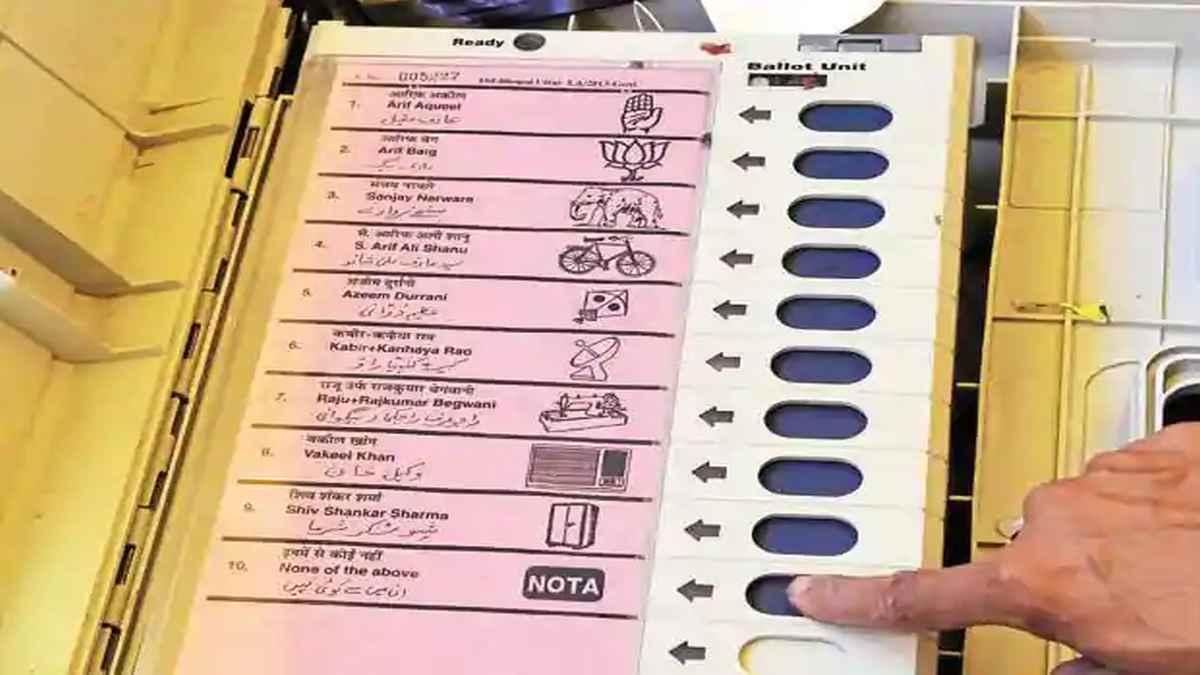The Delhi High Court has dismissed a public interest litigation challenging the procedure adopted for conducting the first level checking’ of EVMs and VVPAT’s ahead of the upcoming general elections.
The high court said the notion of petitioner Anil Kumar, President of Delhi Pradesh Congress Committee, that re-convening the first level checking (FLC) would not lead to any time loss is a perspective which the court finds hard to accept.
The Election Commission of India (ECI) operates on strict timelines and delays can potentially jeopardise the entire electoral process, it said.
“Given the specificity of the timelines mentioned in ECI’s instructions and advanced stages of the general elections process, as highlighted , any alterations, such as re-initiation of the process, would be a significant regression. Ultimately, the aim of the FLC and the entire electoral process is to serve the public and ensure their trust in the democratic process,” a bench of Chief Justice Satish Chandra Sharma and Justice Sanjeev Narula said.
The high court’s order, which was passed on August 29, was made available on its website of Friday.
The bench said the safeguards and checks embedded in the guidelines are sufficient to ensure the integrity of FLC process and the inclusion of political representatives in sealing the EVMs is a significant step towards mutual accountability.
“Every recognised political party was given an equal opportunity to be a part of the process. Thus, there participation in this democratic process plays a pivotal role in ensuring its sanctity,” it said.
The petition claimed that sufficient notices were not given for carrying out FLC and the political parties thus could not prepare themselves for the process and sought to direct the ECI to re-convene the FLC after giving sufficient notice.
It said as per the prevalent mandate, the political parties ought to be intimated of the FLC at least one week prior to its commencement and a mere two-day notice prior to the commencement of FLC did not afford the political parties sufficient opportunity to instruct booth level agents or engage individuals with the requisite training in order to effectively participate in the process.
The counsel for District Election Officers concerned argued that the FLC process strictly adhered to extant norms, including the ECI’s instructions, as revised from time to time.
He said the petitioner as well as other eligible stakeholders were given adequate notice for participation in the FLC process. However, for reasons best known to the petitioner’s side, they opted not to delegate their representatives.
The counsel said FLC process for EVMs and VVPATs has been finalised in three states of Kerala, Jharkhand and Delhi and the procedure is in progress for another five states.
In Delhi alone, a total of 42,000 ballot machines and 23,000 VVPATs have been checked and the directions proposed by the petitioner, if granted, could potentially derail the pre-fixed election schedule.
The high court said the involvement of political parties, down to the acknowledgment of the FLC “OK” machines, underlines the democratic spirit and the inclusivity of the process. However, the DPCC notably “chose to stay away”.
The high court said the FLC is a meticulous procedure, designed to uphold transparency, integrity, and security of the electronic voting system and the process is executed by certified engineers from Bharat Electronics Limited (BEL) and Electronics Corporation of India Limited (ECIL).
The court said the process encompasses several vital steps like the initial clearance of machines by officials designated by the DEO, a comprehensive visual inspection conducted by authorised engineers from BEL/ ECIL, rigorous functionality tests using the pre-first level checking unit by field engineers and symbol uploading in VVPATs through the symbol loading unit by BEL/ ECIL’s authorised engineers, for mock polling.
“The petitioner’s reservations regarding the process stem from a perceived lack of prior information regarding the list of EVMs and VVPATs scheduled for checks. The court, upon perusal of the stipulated instructions and procedures, does not find any such directive demanding prior notification. There are sufficient robust procedures which exude complete transparency,” the bench said.
It said the sealing process a crucial part of FLC is not just demonstrative in nature but also participative, allowing political representatives to mark their approval through signatures.
The provisions for recording and distributing details like the unique number of control units and pink paper seal serial numbers enhance the process’ credibility, leaving little room for scepticism, it said, adding that given the rigorous and transparent procedure, the petitioner’s contentions questioning the reliability or security of the FLC process, are “unfounded”.
Also Read
The bench said the insistence by senior advocate Salman Khurshid, representing the petitioner, on pre-providing serial numbers does not stand as a legitimate premise for the relief of re-initiating the entire FLC process.
“The court’s specific inquiry into DPCC’s non-participation during FLC yielded no substantial justification, apart from the repetitive claim of lack of serial numbers and a non-responsive stance from respondents regarding their representation dated July 15, 2023.
“Given the gravity of the electoral process, the petitioner’s focus should have been on active participation, rather than on abstaining due to procedural apprehensions,” it said.
The bench was of the view that when a procedure as significant as the FLC offers opportunities for representation and observation from political entities, it becomes the duty of these representatives to participate actively and ensure the process’ credibility.
Abstaining from participation and later questioning the integrity of the same process does not reflect well on the petitioner, it said.
The court said the petition lacked substantive ground and it was not inclined to accede to the relief sought by the petitioner.




